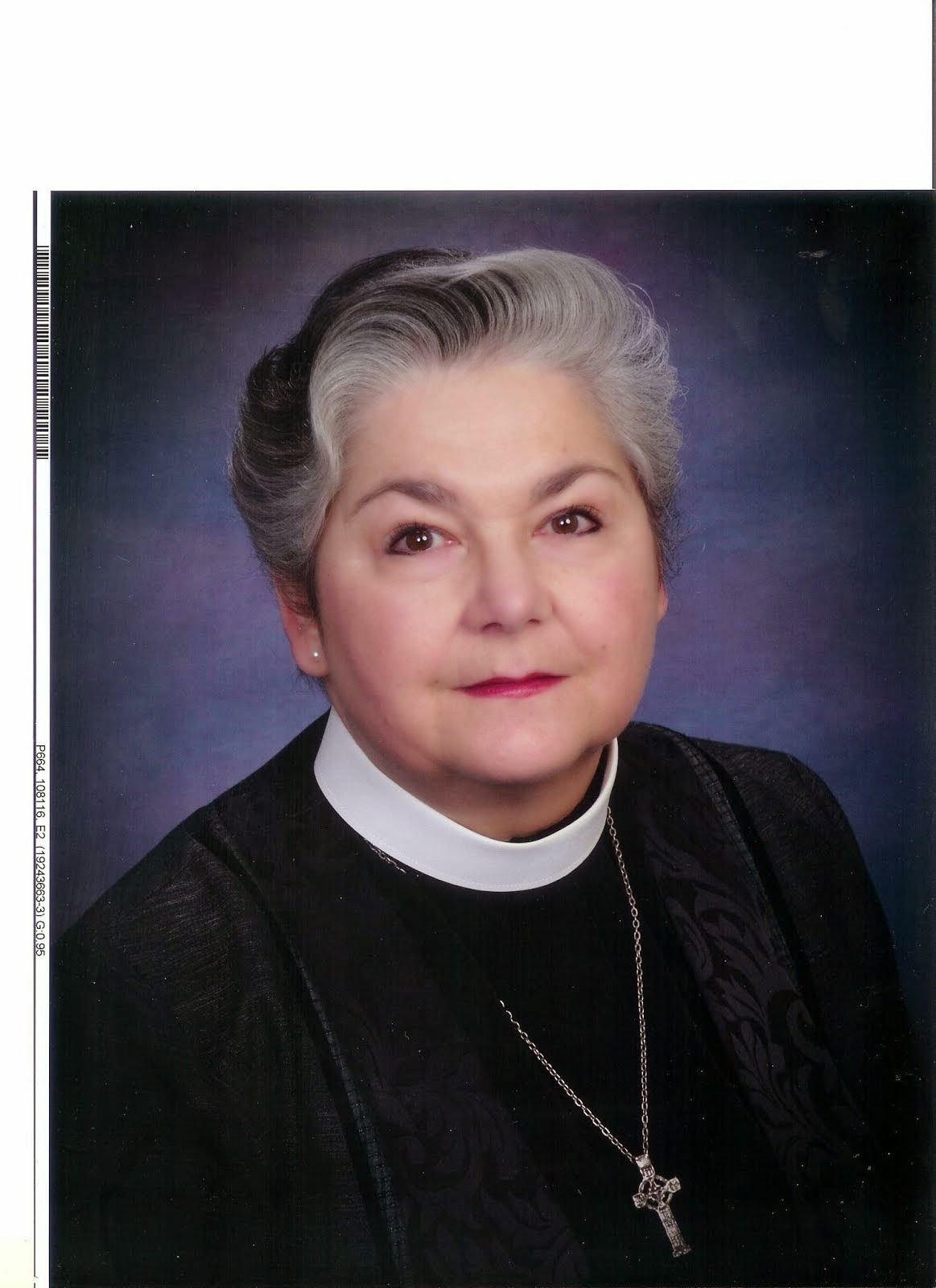How do we build a church? Repent. Be baptized as a follower of Christ. Share the teachings. Share a simple meal.
That what we have been reflecting upon these past few weeks, as we have moved from the glory of the resurrection to the task of carrying on what Jesus taught us. Building a church, one step at a time.
It started out simple, but it didn’t take long before it got more complicated. We’re human beings. We tend to take the beautifully simple, and make it twisted and complex, with exceptions and questions and arguments and struggles for power.
We see how that starts to unfold in the earliest days of the church when we hear Stephen’s story today in the reading from the Acts of the Apostles. It’s a glorious moment…Stephen has an ecstatic vision of heaven and of Jesus, with God the Father. But then the people to whom he is speaking grab him and stone him to death. It is a martyr’s death, and Stephen dies echoing the words we heard from Jesus “Lord, receive my spirit” and “Lord, do not hold this sin against them.”
Not a very happy ending to Stephen doing what Jesus had told him to do, simply following the instructions to teach and to baptize. The rosy glow of excitement at the start of a mission ends in a brutal death, a palimpsest of the crucifixion.
Well, it’s a little more complicated than this truncated piece of Stephen’s mission would lead us to believe, so I’m going to give you some more of the story.
Stephen had been anointed and sent out into the mission field, along with some other people who seemed to have the gifts to do that work. Off he went, with memories of the time that Peter preached and 3000 were baptized.
It would be simple, right? Preach a good sermon and they would flock to him for baptism, right?
Ummm, no.
Stephen went to a synagogue to teach – that was how you reached out to members of the Jewish community, by teaching. He worked some miracles, the details of which are now lost in time. Some of the people were troubled by what they heard, and misrepresented his teachings, saying "We have heard him speak blasphemous words against Moses and God."
This got the synagogue leadership pretty upset, so they asked Stephen to come and explain himself. He responded with a fire and brimstone sermon – it runs fifty-two verses, much longer than any Episcopalian would sit still for – and it ends up, "You stiff-necked people, uncircumcised in heart and ears, you are forever opposing the Holy Spirit, just as your ancestors used to do. Which of the prophets did your ancestors not persecute? They killed those who foretold the coming of the Righteous One, and now you have become his betrayers and murderers. You are the ones that received the law as ordained by angels, and yet you have not kept it."
Whoa! Not a shock that the people who heard this excoriation reacted the way that they did. They were enraged.
And even though he followed up the sermon with a joyful exclamation that he was having a vision of heaven and of Jesus, they were having none of it. They did exactly what he himself predicted: this prophet of the words of Jesus was murdered.
That’s what we do to prophets when they tell us in no uncertain terms how off-track. we have become. Whether it is a scientist saying we need to address our excessive use of fossil fuels to save the earth, God’s creation, from catastrophic climate change, whether it is an economist saying that Federal budgets laden with pork-barrel spending and special deals for the rich are unsustainable, whether it is a doctor saying that if we don’t stop eating those Krispy Kremes we’re going to have a heart attack…we don’t like someone to tell us that we are doing something wrong. And so, either physically or metaphorically, we kill the prophets. Jesus knew that: “Jerusalem, Jerusalem, the city that kills the prophets and stones those who are sent to it! How often have I desired to gather your children together as a hen gathers her brood under her wings, and you were not willing!” Say the wrong thing, you’ll come to a hard end.
That’s why we preachers so rarely preach like prophets. To be blunt, we’re afraid. We saw what happened to Stephen when he called them out. We saw what happened to Martin Luther, who was nearly killed several times for decrying the failures of the church. We saw what happened to Dietrich Bonhoeffer, a German Lutheran pastor and professor who was killed by the Nazis for his opposition and for his part in an assassination attempt against Hitler. We saw what happened to Dr. Martin Luther King.
Prophets usually get killed.
No wonder we don’t preach like prophets.
We’re afraid.
There are exceptions, of course. The great Old Testament Scholar Walter Brueggemann still preaches with power and conviction, reminding us of our heritage as Abraham and Sarah’s sons and daughters, and how we, like the Israelites, have often failed in our covenant with God. Stanley Hauerwas, a Christian ethicist and ardent opponent of war, is sometimes called the crankiest man on the planet. Yes, he’s cranky, just like Jeremiah was, or Isaiah. Prophets don’t care what people think of them. They call it like they see it.
So the question for me, when I hear Stephen’s story, is this: should I preach it like I see it, and start ducking when I see the stones headed my way? Should I temper the message so I don’t aggravate anyone’s sensibilities, but miss the opportunity to shape someone’s understanding about how they need to change to follow the Gospel?
Ah, yes…the Gospel. That’s what I go back to whenever I am perplexed.
So I take a look at today’s Gospel, Jesus in discourse with his disciples. This is a very familiar passage – we often proclaim it at memorial services, as you know. Jesus is talking, elliptically and poetically as he always does in the Gospel of John, about leaving them and going to be with his Father in heaven. They don’t get it. Not surprisingly, Thomas asks a clarifying question. Thomas is the king of the clarifying questions. Jesus answers “I am the way and the truth and the life.” Jesus thinks he’s answered the question. But then Philip, one of the disciples that eventually went out into the mission field with Stephen, pipes up with another idea. “Well, Lord, we don’t quite understand all this way and truth and life stuff. Just make it simple for us. Just show us your heavenly Father and then we’ll be cool with it.” Seeing is believing, right? I guess he wasn’t paying attention during that whole mess with doubting Thomas and the wounds in the hands and side.
Now at that point, Jesus could have gotten all prophetic on him, and started shouting, “You stiff-necked dummy! Your heart and your ears are uncircumsized”, just as Stephen would later tell the listeners in the synagogue. But Jesus, although frustrated with their lack of understanding, chose to deal with it in a different way. He reframed the problem for them, and encouraged them. He was both prophetic and pastoral, a shepherd guiding his flock.
Jesus said, “I wish you would understand this. You don’t need to see the Father with your eyes. You’ve got me. See me, see my Father. It really is that simple. And if you trust me on this, you’ll be doing the same remarkable things that I have done while I was with you.”
Not a tirade about how thick they seemed. A sigh, and then an explanation, and then an encouragement.
And that’s the kind of prophetic preaching I think I can manage without fear of stones aimed at my head. Prophetic, but also pastoral. Sometimes my teaching and preaching will point out where we all get off track, where we all forget what Scripture teaches us. It would be presumptuous of me to assume that you’re the only ones with the problem here. We share the same struggles. We are all on this road together to greater fulfillment of the great commandment. So don’t expect me to call you a stiff-necked uncircumsized people – I know who among you has a stiff neck, but the other thing, that’s way too much information for any preacher to have – but do expect that sometimes we will talk together of uncomfortable things, of the ways we all struggle and fail, of the things we do that causes God to wonder if we are ever going to get it.
But if I don’t balance that with encouragement, with my certainty that with God’s help, we can all do better, then I deserve stones. If I simply say what we do wrong and don’t offer the hope that we can fulfill what Jesus expects of us, then I deserve criticism.
Building a church, as the disciples learned, is a process of trial and error. We do something, and it works marvelously (3000 baptized!) and we rejoice. We do something else, and it is an abysmal failure, and we worry that it will cause the walls to fall down around us, or that those stones will be aimed directly at our heads. But the thing the disciples figured out, a few dumb questions and a few arguments later, and that we are still figuring out amid our own questions and arguments, is the one thing that Jesus reminds us. He is with us. We ask him, he helps. He is the way, the truth and the life.
We build our church on him, speaking out when we get off-track, encouraging when we struggle. We are both prophetic and pastoral, because Jesus taught us to be. A stone here or there, it will happen. We will most likely not be stoned to death. We will ask dumb questions and get off-track. But no matter what, we have the best of teachers and models to help us, to give us the tools to build with.
And for the time being, please keep those stones in your pockets.
Amen.











